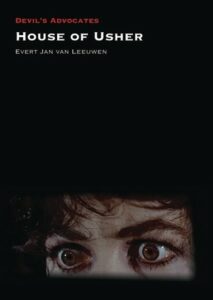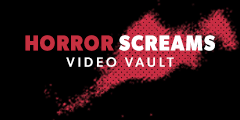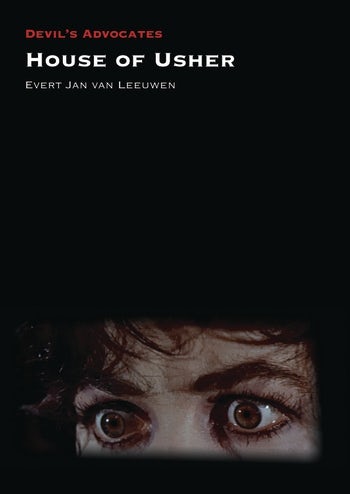HOUSE OF USHER (DEVIL’S ADVOCATES) by Evert Jan Van Leeuwen
 Author Evert Jan Van Leeuwen brings a welcome personal touch to this informative celebration of the first of Roger Corman’s beloved Poe Cycle. The monograph opens with Van Leeuwen’s memories of discovering ‘The Fall of the House of Usher’ and the cinematic Poe films via the BBC’s Corman-Poe season of 1990, sparking a love of the Gothic and a fascination with the film’s place in the pantheon of Poe adaptations and Corman’s career. How many teenager viewers empathised with the angsty Roderick Usher at the same time as Van Leeuwen? Maybe more than we imagined…
Author Evert Jan Van Leeuwen brings a welcome personal touch to this informative celebration of the first of Roger Corman’s beloved Poe Cycle. The monograph opens with Van Leeuwen’s memories of discovering ‘The Fall of the House of Usher’ and the cinematic Poe films via the BBC’s Corman-Poe season of 1990, sparking a love of the Gothic and a fascination with the film’s place in the pantheon of Poe adaptations and Corman’s career. How many teenager viewers empathised with the angsty Roderick Usher at the same time as Van Leeuwen? Maybe more than we imagined…
This Devil’s Advocate tracks Poe’s career – in the context of Gothic works from the same period and with ‘Usher’ as a key “journey into the night” – in parallel to Corman’s own. The cinematic context offers a useful examination of Corman’s cultured background, his artistic ambitions and his penchant for very low budget films centered around a specific idea and often within a contained Poe-esque backdrop. Van Leeuwen even finds a romantic quality akin to Poe in as unlikely Corman B-movies as NOT OF THIS EARTH. The book intelligently posits the ways in which Poe’s existential angst provided the perfect union with the A-Bomb paranoia of the period in which Corman made his name, culminating with the romantic Poe-inspired, raven-accompanied misfit at the centre of one of Corman’s last directorial efforts, GASSSS.
The book analyses the difficulties in adapting a story as melancholic and uniquely structured as ‘Usher’, with Corman’s choice of Richard Matheson as screenwriter a crucial one, having already written “Mad House” (1954), itself a tale of alienation and a disintegrating mind. The finished script, a canny psychological take on the perennial haunted house movie, offered clever subversions of the original text, and Van Leeuwen offers an insightful look at Matheson’s own stamp on the material as a cinematic piece equally informed by Freudian psychology and by Corman’s collaborators. The film was infused with not only the spirit of Poe, but of Expressionist horror, EC Comics and even 17th century still-life’s, while the author considers the evolution of Corman’s style, drawing parallels to WAR OF THE SATELLITES and others.
There’s a valuable discussion of how HOUSE OF USHER was relevant and appealing to youth culture at the turn of the decade, while positioning Usher himself as another self-absorbed, wronged creative genius for its magnetic star Vincent Price, his drawing room considered as a Gothic version of art lover Price’s own. Running throughout this intelligent, detailed study of a classic genre film is Van Leeuwen’s enthusiasm and personal attachment to both Poe and Corman. The book’s lasting triumph is a real attempt to understand the ways in which this dialogue-driven, claustrophobic period piece captured the imagination of the 1960 audience and was entirely in keeping with Corman’s fondness for people on the fringes of society, a surprising successor to A BUCKET OF BLOOD and non-Corman fare like REBEL WITHOUT A CAUSE
Review by Steven West
HOUSE OF USHER is available now on KINDLE and PAPERBACK

